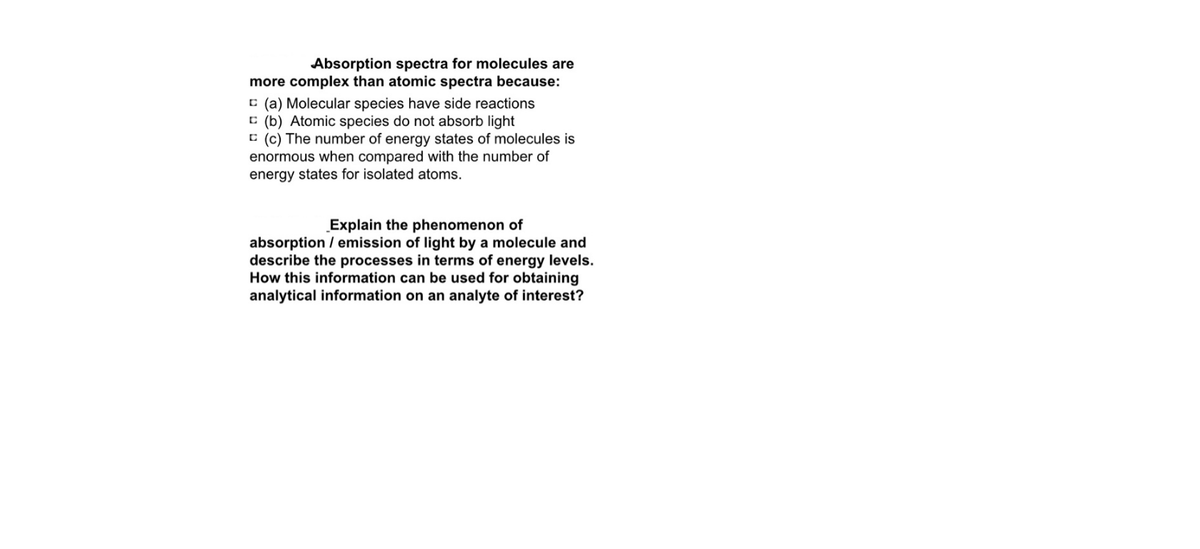Absorption spectra for molecules are more complex than atomic spectra because: C (a) Molecular species have side reactions C (b) Atomic species do not absorb light C (c) The number of energy states of molecules is enormous when compared with the number of energy states for isolated atoms. Explain the phenomenon of absorption / emission of light by a molecule and describe the processes in terms of energy levels. How this information can be used for obtaining analytical information on an analyte of interest?
Absorption spectra for molecules are more complex than atomic spectra because: C (a) Molecular species have side reactions C (b) Atomic species do not absorb light C (c) The number of energy states of molecules is enormous when compared with the number of energy states for isolated atoms. Explain the phenomenon of absorption / emission of light by a molecule and describe the processes in terms of energy levels. How this information can be used for obtaining analytical information on an analyte of interest?
Physical Chemistry
2nd Edition
ISBN:9781133958437
Author:Ball, David W. (david Warren), BAER, Tomas
Publisher:Ball, David W. (david Warren), BAER, Tomas
Chapter15: Introduction To Electronic Spectroscopy And Structure
Section: Chapter Questions
Problem 15.69E
Related questions
Question
Solve these

Transcribed Image Text:Absorption spectra for molecules are
more complex than atomic spectra because:
C (a) Molecular species have side reactions
C (b) Atomic species do not absorb light
C (c) The number of energy states of molecules is
enormous when compared with the number of
energy states for isolated atoms.
Explain the phenomenon of
absorption / emission of light by a molecule and
describe the processes in terms of energy levels.
How this information can be used for obtaining
analytical information on an analyte of interest?
Expert Solution
This question has been solved!
Explore an expertly crafted, step-by-step solution for a thorough understanding of key concepts.
Step by step
Solved in 2 steps

Knowledge Booster
Learn more about
Need a deep-dive on the concept behind this application? Look no further. Learn more about this topic, chemistry and related others by exploring similar questions and additional content below.Recommended textbooks for you

Physical Chemistry
Chemistry
ISBN:
9781133958437
Author:
Ball, David W. (david Warren), BAER, Tomas
Publisher:
Wadsworth Cengage Learning,

Principles of Modern Chemistry
Chemistry
ISBN:
9781305079113
Author:
David W. Oxtoby, H. Pat Gillis, Laurie J. Butler
Publisher:
Cengage Learning

Physical Chemistry
Chemistry
ISBN:
9781133958437
Author:
Ball, David W. (david Warren), BAER, Tomas
Publisher:
Wadsworth Cengage Learning,

Principles of Modern Chemistry
Chemistry
ISBN:
9781305079113
Author:
David W. Oxtoby, H. Pat Gillis, Laurie J. Butler
Publisher:
Cengage Learning